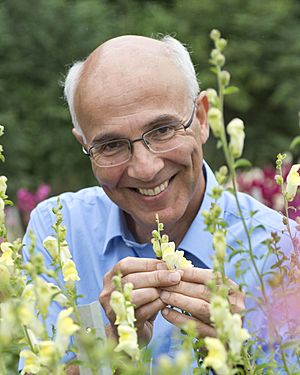Enrico Coen facts for kids
Quick facts for kids
Rico Coen
|
|
|---|---|
 |
|
| Born |
Enrico Sandro Coen
29 September 1957 |
| Nationality | British |
| Alma mater | University of Cambridge (PhD) |
| Awards |
|
| Scientific career | |
| Fields | Plant biology |
| Institutions |
|
| Thesis | The dynamics of multigene family evolution in Drosophila (1982) |
| Doctoral advisor | Gabriel Dover |
Enrico Sandro Coen (born on September 29, 1957) is a British biologist. He studies how plants create their amazing and different flower shapes.
Coen's research helps us understand the rules that guide how flowers and leaves grow. He looks at growth from tiny cells all the way up to the whole plant. This helps scientists learn more about how plants have changed over time. He uses many methods, like studying genes, taking pictures, and using computers to understand flower development.
Early Life and Education
Enrico Coen's father was a physicist, and his mother was a chemist. When he was 15, Coen became very interested in biology. He read a book called The Chemistry of Life, which was about biochemistry.
He liked thinking about complex ideas. He wasn't sure if he wanted to study chemistry or genetics. In the end, he chose genetics. He joked that it was because the classes started later and there was coffee for exams!
After finishing his first degree at King's College, Cambridge in 1979, Coen stayed at Cambridge. He worked on his PhD, which is a higher degree. In 1982, he earned his PhD. His research was about Drosophila, which are fruit flies. He studied how genes in fruit flies worked and changed over time.
Career in Plant Biology
In 1982, Coen became a research fellow at St John's College, Cambridge. He decided to study "supergenes." These are groups of genes that work together. They can affect how living things develop and change over many generations.
He learned that a good example of supergenes was found in primrose flowers. So, he joined the lab of plant biologist Dick Flavell. This lab was at the Plant Breeding Institute in Cambridge.
After a year, he moved to the John Innes Centre in Norwich. This center studied a plant called Antirrhinum, also known as snapdragon. Coen and his colleague Cathie Martin joined the lab there.
Coen looked for snapdragon plants that had unusual flowers. For example, some might have sepals (leaf-like parts) instead of petals (the colorful parts). Others might have carpels (female parts) instead of stamens (male parts). He found that these changes were caused by small pieces of DNA moving around.
He eventually discovered that three main groups of genes control how snapdragon flowers form.
- One group (Class A) controls the sepals.
- Class A and another group (Class B) together control the petals.
- Class B and a third group (Class C) control the stamens.
- Class C alone controls the carpels.
Coen also worked with Elliot Meyerowitz to create computer models. These models showed how plant cells and their genes work together. They helped to understand how flowers grow and how they get their colors. In 1994, he showed that the way flowers develop is similar across many different plant species.
In the 1990s, he worked with Przemysław Prusinkiewicz. Prusinkiewicz was a computer scientist who knew a lot about how living things develop. They used computer modeling to connect gene activity to how plants grow and their shapes.
Books and Achievements
Coen has written several books. One of them is Cells to Civilizations: The Principles of Change That Shape Life. In this book, he talks about seven key things that help shape life. These include things like how living things vary, how they last, how they compete, and how they work together.
Awards and Honours
Enrico Coen has received many important awards for his work:
- He won the EMBO Gold Medal in 1996.
- He received the Linnean Medal in 1997.
- In 1998, he became a Fellow of the Royal Society (FRS). This is a very high honor for scientists in the UK.
- He became a Foreign Associate of the NAS in 2001.
- In 2003, he was given the CBE award for his great work in plant genetics.
- In 2004, Coen won the Darwin Medal with Rosemary Carpenter.
- From 2012 to 2015, he was the President of the Genetics Society.
- In 2016, he received the Croonian Medal & Lecture and the Waddington Medal.
- Coen is also a member of Faculty of 1000, which is a group of top scientists.

